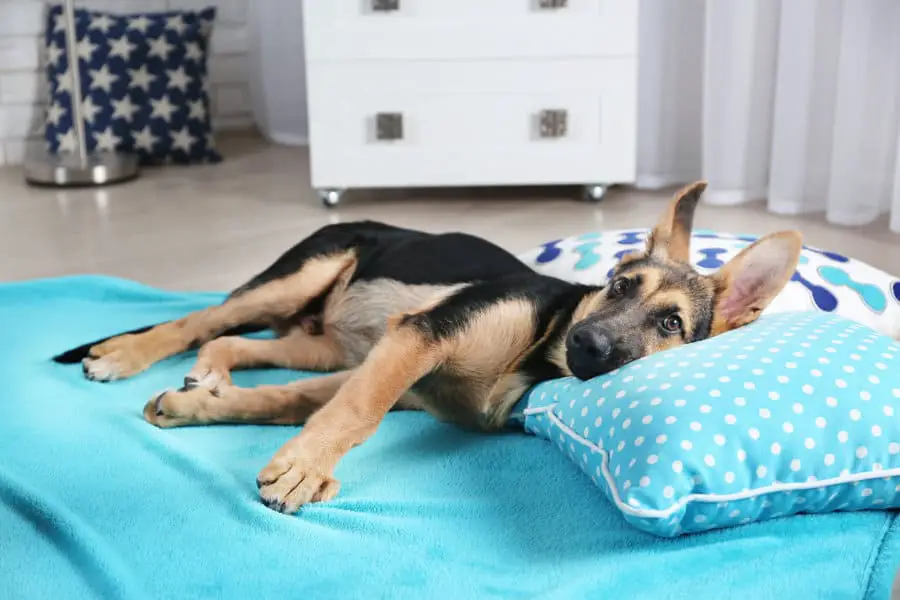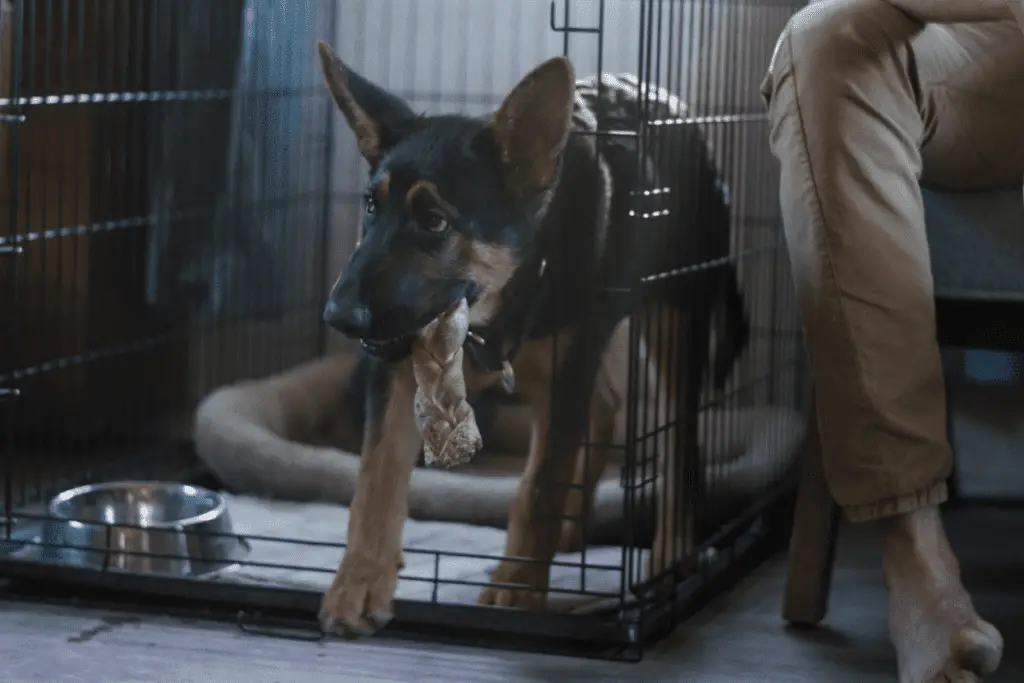How long do German Shepherd puppies sleep? And where should they sleep? Can they sleep in the bed with you? Do I need a crate? There are often so many questions for the new puppy owner.

Sleep training a German Shepherd puppy without a crate can be done with consistency, patience, and a routine. Here are some steps to consider:
- Establish a Sleep Area: This should be a comfortable, quiet, and secure area where the puppy can relax. This could be a designated room or an area with a dog bed or blankets. Make sure it’s puppy-proofed, meaning there are no objects that could be chewed or swallowed.
- Set a Routine: Puppies thrive on routine. Establish a consistent schedule for feeding, playing, training, and sleeping. Puppies typically sleep a lot, up to 18 hours a day, but this will be spread throughout the day and night.
- Last Potty Break: Before bedtime, ensure your puppy has a chance to go to the bathroom one last time. Puppies have small bladders and it can take several months before they can hold it throughout the night.
- Calm Down Time: Help your puppy wind down with calm, relaxing activities in the hour or so before bed. This can be a good time for gentle petting or a calm game, but avoid high-energy play that could get your puppy excited.
- Ignore Whining (at first): It’s common for puppies to cry or whine at night when they’re getting used to their new routine. Unless you suspect they need to go to the bathroom or there’s another urgent issue, try to ignore the noise. Responding to whining can teach your puppy that making noise gets your attention.
- Nighttime Potty Breaks: Expect to take your puppy out for bathroom breaks during the night. Very young puppies might need 1-2 nighttime breaks. As your puppy grows and can hold their bladder longer, you can gradually phase out these nighttime breaks.
- Consistency: This is key in any training regimen. Stick to your routine and rules, and your puppy will eventually catch on.
Remember, each puppy is unique, and what works for one might not work for another. Adjust your routine as needed based on your puppy’s behavior and needs. If you’re struggling with sleep training, don’t hesitate to reach out to a professional dog trainer or your vet for advice.

When Should German Shepherd Puppies Sleep Outside of Their Crate?
Before trying to sleep train your puppy without a crate, it is essential to understand the recommended age for a German Shepherd puppy to do so. Different dog breeds have various characteristics; what is suitable for one may not be the best for another.
Several of those characteristics in German Shepherd Dogs (GSDs) lead experts to advise against allowing this breed to sleep outside of their crates until they have reached maturity.
- GSDs can become very clingy. German Shepherds are prone to separation anxiety and form strong bonds with their owners. As puppies, they need to sleep in a crate to learn independence and have their own safe space.
- GSDs need a strong leader and firm boundaries. These dogs also need to be gently but firmly reminded of who is in charge. The German Shepherd eagerly follows a strong leader and will seek to please them.
On the other hand, these dogs will not respect a leader who is not consistent. Having them sleep in a crate until they are older and not allowing them in your bed is just one way to show the GSD that you are their alpha. - GSDs need to adjust to a sleep schedule as puppies. Having your German Shepherd puppy sleep in a crate will help them develop good sleep patterns by giving them a set time to sleep and wake.
- GSDs need to potty often as puppies. Sleeping in its crate will also help tremendously with potty training since these animals do not like to go potty where they sleep. These puppies cannot hold their bladders for more than 4 hours at a time at 3 months old.
They will not usually sleep through the night without needing a bathroom break until at least 6 months of age. So, a German Shepherd puppy sleeping outside its crate often means puddles on your floor in the morning.
All these facts are true of GSDs but not necessarily of other puppies. It is best to wait until the puppy has matured before allowing it to sleep with you or outside its crate. During the day, the puppy can be tethered to you with a leash to ensure it doesn’t get into trouble.
What is this “magic age of maturity”? According to some experts, it can be anywhere from 6 months to 18 months old, although some GSDs can take even longer to mature. According to the Humane Society, you should never confine a puppy for over 4 hours.
Once your puppy sees its crate as its safe space, has developed a healthy sleeping routine, has learned not to chew on anything dangerous, sleeps through the night, and is no longer having potty accidents inside, it may be time to let it sleep outside of its crate.
When Can Your German Shepherd Puppy Sleep in Bed With You?
As mentioned, German Shepherds should not sleep in bed with their owners until they have reached adulthood.
Once you have established their routine, have asserted your dominance, and there is no longer a danger of them getting into trouble while you’re sleeping, they can sleep wherever you want them to.
However, there are always exceptions to a rule. If your dog shows any signs of being territorial or aggressive, it should never be allowed to sleep in your bed. Dogs are pack animals, and allowing the dog to sleep with you could give it the impression that its pack status is the same as yours.
You should also hesitate to allow your German Shepherd in your bed if:
- The dog snores, kicks, or seems to dream, as this can interrupt your sleep.
- You have allergies that may be triggered by the dog’s fur or grass and weed pollen that may be in its coat.
- Your human sleeping partner doesn’t want the dog in your bed.
While allowing your German Shepherd dog to sleep with you could cause issues, a study by the Mayo Clinic indicates that it might not be as harmful as once believed. Basically, it depends on the personality, training, and habits of the dog.
Life After the Crate
Once your dog has learned to sleep in the crate, there isn’t much to do to train them to sleep without one.
A German Shepherd who is ready to sleep outside the crate already has an established sleep pattern; a time to wake up and go to bed. They will already be fully potty trained and not need to wake up at night to go outside.
GSDs who are mature enough to sleep outside their crate will also already have a good sense of who is in charge and will follow their owner’s commands easily. There won’t be a risk of them chewing wires or furniture or exploring places they shouldn’t be.
The fully trained and mature GSD can even be allowed to decide for themselves whether to sleep inside or outside. By leaving the doggy door unlocked at night, you give it the option to come and go as it pleases.
You should only do this if you have a safe, fenced-in area for him to roam, and you should be aware that other animals may come in through that door.
Conclusion
In conclusion, sleep training a German Shepherd puppy, or any puppy, without a crate requires consistent routines, a safe sleeping area, and a measure of patience. This includes establishing a regular sleep schedule, offering a final potty break before bed, and ensuring there’s calm, quiet time before bedtime. It’s important to be prepared for some initial resistance in the form of whining or crying during the night, but with consistent practice, your puppy will learn to settle down and sleep through the night.
Ensuring your puppy doesn’t engage in strenuous or potentially harmful activities, such as excessive stair-climbing, is also vital, especially for breeds like German Shepherds that are predisposed to certain joint issues. Always remember that each puppy is unique and what works for one may not work for another. If sleep training becomes overwhelming or if you notice any health concerns, seeking advice from a professional trainer or your vet is always a wise choice. Through consistent effort and attentive care, you will be able to successfully establish healthy habits and routines for your German Shepherd puppy.
